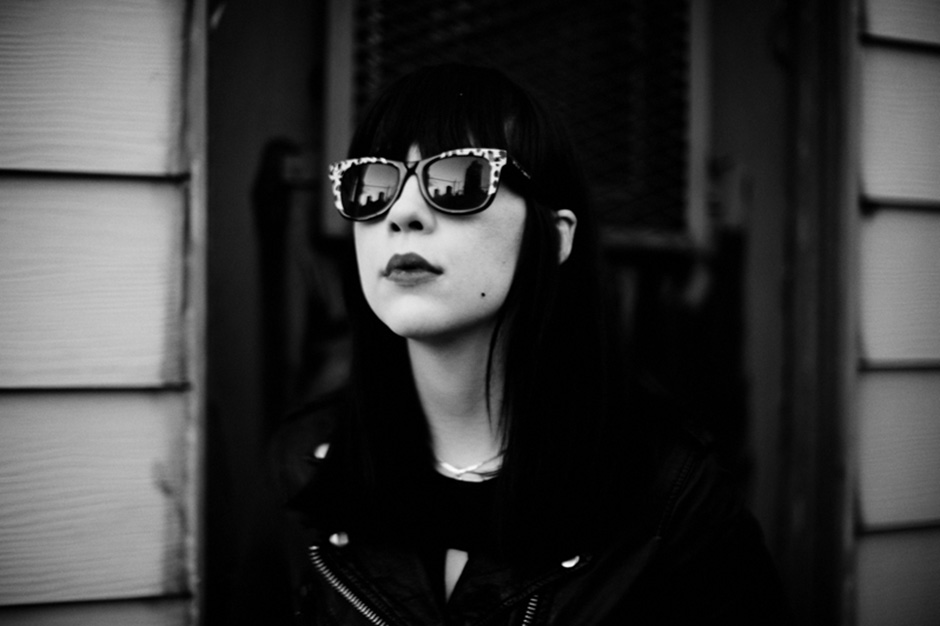Release Date: January 21, 2014
Label: Sub Pop
On their expertly arranged and fleet-footed third album, Dee Dee Penny and her Dum Dum Girls (current lineup: Jules, Sandy, Malia) exemplify what is hereby dubbed indie-rock’s Wowee Zowee/A Season in Hell rule. To wit, a) bedroom projects, no matter how lo-fi their origins, soon embrace multi-tracked studio grandeur, and b) all white bohemians eventually discover the French Symbolists.
Concerning that first point, Dee Dee’s been moving steadily beyond the tinny clatter of her first EPs since signing to Sub Pop in 2009, all those whipsaw guitars crunching into separate channels while her throaty contralto gained heft and distinction. Sixties scuzz-pop royalty Richard Gottehrer remains her go-to studio advisor since first being tapped to theoretically produce 2010’s I Will Be, and her admiration is understandable: The dude wrote “I Want Candy” and “My Boyfriend’s Back,” which means he’s pretty much the Cædmon of trash-pop. Still, the band only could pogo ahead over familiar chord changes for so long. Murmur as she might over the rumble of “He Gets Me High,” Dee Dee didn’t begin suggesting her own individuality until 2011’s Only in Dreams, tentatively embracing 4AD dream-pop.
But on Too True, Dee Dee and Gottehrer (plus Raveonette/fellow trash-pop fan Sune Rose Wagner) embrace the rich synth/pedal blur of Ian McCulloch-style neo-psychedelia and 1980s U.K. college rock in all its nebular glory, right down to the spaghetti-Western guitar fusillades proving a dead ringer for Billy Duffy-era the Cult. Dee Dee cites Siouxsie and the Banshees as a primary influence, but there’s little in the way of Siouxsie Sioux’s doom wails here. (Although the electric contortions of one-time Banshee John McGeoch are suggested throughout — did I mention this was a Guitar Album?) More noticeably, Dee Dee remains an uncanny, if distant disciple of Chrissie Hynde, honorably encapsulating Hynde’s tender/bad-girl swagger, but giving little indication that she could bring a line like “Stop snivellin’/You’re gonna make some plastic surgeon a rich man” to a knife fight.
Yet she also pouts her way through the smoldering “Are You Okay” like that other post-punk Chrissie (well, Chrissy) — Ms. Amphlett of the Divinyls. And over the course of Too True‘s 30-odd minutes, the Dum Dum’s craft some of the best and most varied music of their career. There’s the cheery mope of “Little Minx,” an appealing slice of sunshine goth that’s as suitably SoCal as Bats Day in Anaheim; the Darklands crawl of “Trouble Is My Name”; and the shoegaze fuzz froth of lead single “Lost Boys and Girls Club,” whose video showcases big-haired angels yanking sunglasses from dry-ice dishwashers and all manner of hangers-on slumped onstage like a Sisters of Mercy casting call, while a leather-clad Dee Dee cavorts in Joan Jett/Trent Reznor mode (scrunch up your face and you’ll hear an oblique melodic reference to NIN’s “Head Like a Hole” throughout).
Which brings us to white bohemians and French Symbolists. In an “open letter” exploring Too True‘s genesis, Dee Dee referenced “chasing pop into the dark,” a tall stack of books, and Nick Cave’s 1996 MTV Video Music Awards j’accuse — the one where Cave refused ceremonial competition due to reasonable concerns that “MY MUSE MAY SPOOK! MAY BOLT!” The authors inscribed on the spines of those books receive honorary notice as Dee Dee’s “artistic collaborators,” and so to her previous anointments of Sonny Bono and Morrissey we now may add Rilke, Sylvia Plath, the artsy erotica of Anaïs Nin, and an “admittedly unhealthy obsession” with André Breton’s 1924 Manifeste du surrealism.
Still, it’s those perennial fin de siècle faves Baudelaire, Verlaine, and Rimbaud linking Dee Dee to a long line of rock’n’rollers finding inspiration in dead 19th-century French poets. Arthur Rimbaud alone is a cottage industry among rockers, from the ludicrous 1983 film Eddie and the Cruisers (which dared suggest the heart of Rimbaud pumped deep within the chest of Rhode Island bar-band hack John Cafferty) to Bob Dylan himself, who compared his own fractured relationships to the absinthe-fueled feuds of Verlaine/Rimbaud (“You’re Gonna Make Me Lonesome When You Go”). But Patti Smith remains Arthur’s most vocal rock’n’roll champion, promising to fill her “nose with snow/And go Rimbaud” (1975’s triptych “Land”) and journeying to Abyssinia with the doomed poet to make love and smoke cigarettes (’73’s “Dream of Rimbaud”).
Clearly, Dee Dee’s a late arrival to this party, and while French instructors will wince at her Anglophone renderings on “Rimbaud Eyes,” she’s not wrong to fixate on what even Paul Verlaine himself swooned over (“forever blue,” he gushed about his former obsession’s eyes). But our Dum Dum girl is no poet — linguistic invention and literary references have rarely consumed any part of her corpus. Nor have her intellectual concerns generally been very, um, deep: The scary dreams keeping her awake on “It Only Takes One Night” involved her man finding “another girl,” while similar nocturnal reverie “Bedroom Eyes” worried that “in another bed you’re sleeping.” Too True doesn’t depart much from this template, where clichés abound (“slip of the tongue,” “light as a feather”) and heartbreak staggers forth (“Day in/Day out/And always alone”). Even her Baudelaire shout-out surfaces as a literal translation of his 1857 Les Fleurs du mal: “Evil Blooms” goes the title, “just like a flower” concludes the verse.
But, whatever. No rock’n’roller has ever really approximated the grammatical contortions of the Symbolists, and Dee Dee even manages a few worthy flourishes like “lavender haze” and eyes flashing “black x’s / Of hate and of hexes.” Students of history that they are, the Dum Dums merely echo the ways previous trash-pop denizens have adopted Baudelaire and Co. — awkwardly, enthusiastically, mesmerically. When Dee Dee delivers her deadpan outlaw mythos over album closer “Trouble Is My Name,” the vision she details remains simple: “I wanted to be dead.” As with so much of Too True, it’s more Flowers in the Attic than Flowers of Evil. But it’s also part of a glorious art-goth tradition: bookish rockers chasing pop into the dark, deep within the Hong Kong gardens, where all cats are grey.





